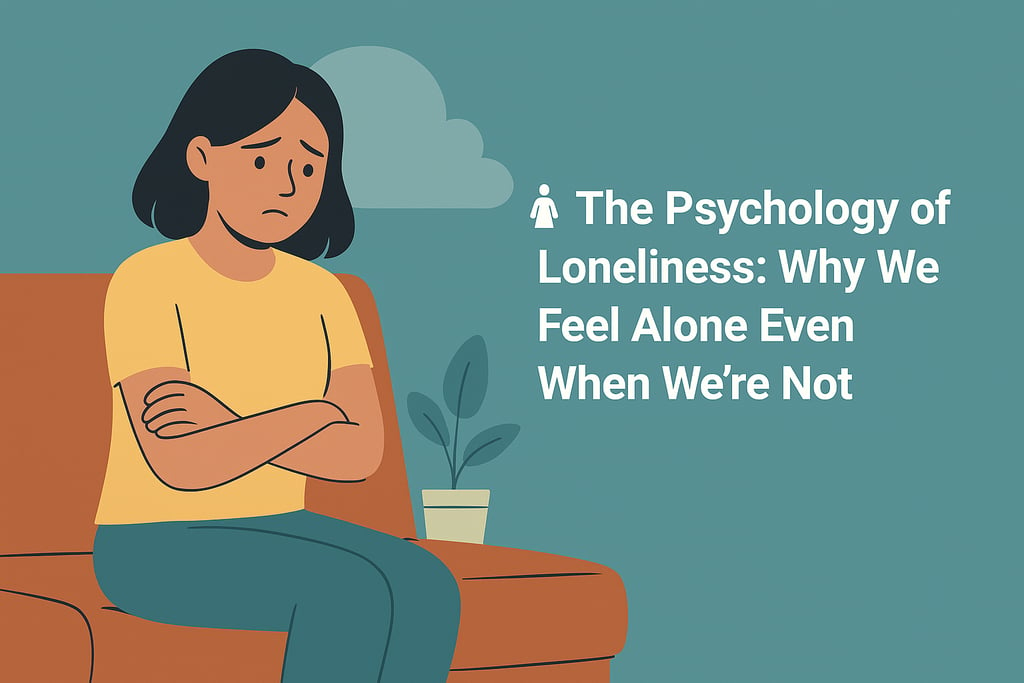The Psychology of Loneliness: Why We Feel Alone Even When We’re Not
You’re surrounded by people — coworkers, family, even friends online. But deep down, you feel it. That hollow, disconnected feeling. The quiet ache of loneliness. And it hits harder when you can’t explain it, because technically, you’re not ‘alone.’ So why do you still feel that way?
4/3/20253 min read


You’re surrounded by people — coworkers, family, even friends online. But deep down, you feel it. That hollow, disconnected feeling. The quiet ache of loneliness. And it hits harder when you can’t explain it, because technically, you’re not ‘alone.’ So why do you still feel that way?
Loneliness isn’t just about physical isolation. It’s about emotional disconnection. It’s the gap between the connection you crave and the connection you actually experience. And it can happen to anyone — whether you’re living alone, in a crowd, or even in a relationship. It’s not always about how many people are around you, but how seen, heard, and understood you feel.
The truth is, loneliness affects more than just your mood. It impacts your body and mind on a deep level. Chronic loneliness can lead to anxiety, depression, and even physical health issues like heart problems or weakened immunity. Your brain is wired for connection — and when it senses a lack of it, it responds as if something is wrong. Because to your nervous system, disconnection is danger.
What makes loneliness so complex is that it often carries shame. We don’t like to admit we feel lonely. We think it means we’re failing somehow — socially, emotionally, personally. So we keep it quiet. We scroll through social media, where everyone else seems connected, happy, busy. And we feel even more alone.
Sometimes we also get stuck in patterns that reinforce loneliness. Maybe we fear rejection, so we pull back. Maybe we’ve been hurt, so we build walls. Maybe we don’t know how to express what we need, so we stay silent. Over time, loneliness becomes a cycle that feels hard to break — because reaching out feels vulnerable, and vulnerability feels risky.
But the truth is, loneliness isn’t a character flaw. It’s a signal — a very human one. It’s your mind and body saying, “I need connection. I need meaning. I need to feel like I matter to someone.” That need is not weakness. It’s biology. And therapy can be a powerful tool in answering that need.
In therapy, you get a safe space to talk about what you’re feeling without judgment. You get to unpack where the disconnection started. Maybe it goes back to childhood, or past relationships, or a loss you never fully processed. Maybe you’ve never had models of healthy connection, and you’re trying to figure it out on your own. Therapy helps you piece those things together — not just intellectually, but emotionally.
Therapy also helps you build the skills that connection requires: emotional regulation, communication, boundary-setting, vulnerability. You begin to understand what kind of connection actually nourishes you — not just any social interaction, but the kind that feels real and mutual and safe.
It’s not a quick fix. But it’s a place to start. A place to be fully seen and heard, maybe for the first time in a long time. That in itself can be healing. And from that foundation, it becomes easier to rebuild trust — in yourself, in others, in the idea that connection is possible again.
If you’ve been feeling lonely — even if you’re always ‘connected’ — you’re not broken. You’re human. In a world that moves fast and rewards busyness, deep connection takes intention. It takes slowing down. It takes honesty. And sometimes, it takes support.
Loneliness is real, and it hurts. But it’s also something you can move through — not by pretending it’s not there, but by acknowledging it and responding to it with care. You deserve to feel connected. You deserve to feel like you belong — not just online, but in your real, lived life.
You’re not the only one feeling this way. And you don’t have to figure it out alone. Connection starts with one small, brave step: telling the truth about how you feel, and letting someone in. That’s where healing begins.